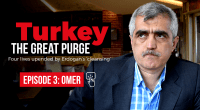‘Mission impossible’ for Turkey’s ambassadors

Date posted: January 19, 2014
CENGIZ CANDAR
For some six years, Turkey’s ambassadors in all corners of the globe have been coming to Ankara in the second week of January to listen to top officials of the country and other speakers deemed appropriate by Foreign Minister Ahmet Davutoglu.
Since the tendency in Turkey is to see the diplomatic elite as “Westernized,” after the Ankara meeting, the ambassadors are taken on a tour of Anatolia. This is the way the AKP government has come up with to train this group of people, who are seen as removed from national values or over cosmopolitan because of their Westernized orientation to the realities of their homeland.
This time, the ambassadors first met in Ankara Jan. 15 before traveling to the Adana and Mersin provinces, not far from the Syrian border. The feature of this sixth session that set it apart from earlier ones was Prime Minister Recep Tayyip Erdogan’s lecture, which sounded like an appeal for help from the ambassadors.
Erdogan faces lots of dilemmas these days. Although he uprooted and reassigned thousands of policemen in the middle of the winter in reaction to the graft probe launched in December, an investigation he labeled a “coup” against his government, and took suppressive and restrictive actions against prosecutors and judges and reassigned some prosecutors, the prime minister has not been freed from his troubles.
While the graft probe was inhibited, the police refused to carry out instructions to pursue the investigations and the prosecutors responsible for the investigations were transferred to other posts, the media began receiving tapes of Erdogan’s telephone conversations. The tapes were obviously leaked to give the impression of illegal or dubious acts. They seem to be working.
The course Erdogan chose to combat these developments is a tough one. He has been able, by the exhaustive use and even abuse of executive powers, to carry out his “bureaucratic cleansing,” but he couldn’t find any way to change the structure of the Supreme Board of Judges and Prosecutors (HSYK) and fully control the judiciary. The structure of HSYK was changed with a constitutional referendum that won 58% support in 2010. It won’t be easy for Erdogan to again change the structure of the HSYK three years later without amending the constitution. The European Union sees his efforts as Turkey giving up on the supremacy of law and the independence of the judiciary.
And what did Erdogan come up with to prevent the leaking of his telephone conversations, which could lead to questions about the legitimacy of his actions? He decided to enact an “Internet law” that would put Turkey in the same category as China, Saudi Arabia and Iran, which will not be well received in Europe.
For today’s Turkey to totally turn its back on Europe is not that easy an option, even if Erdogan is willing to let his country turn away from the European model and become more like the rest of the Middle East.
For Erdogan, the best way to preserve and sustain his rule is to persuade the outside world, especially the West, that the corruption probe is nothing but a coup attempt by disciples of Fethullah Gulen’s faith community.
This is why he is now trying to enlist Turkey’s diplomatic elite. When lecturing the ambassadors, he said the changes the government is trying to make in the judiciary do not amount to intervention, but a struggle against the “illicit structure” within the judiciary. He explained, “The real nature of this organization must be deciphered and exposed also outside of this country. It is important for your audience to well understand this unlawful organization whose structure, activities, goals and desires are clearly known and whose perils have become obvious. The empire of fear this organization has been building within the state security and judiciary bodies in such areas as politics, economy, finance and trade must be well explained. We want you to especially emphasize that the systematic conveying of information in English and other languages to foreign countries is nothing but disinformation and should not be given credit. We will of course do our part to discredit that disinformation. But the real burden, the real responsibility is undoubtedly on your shoulders, the ambassadors.”
Erdogan has thus placed an extremely heavy burden on Turkey’s ambassadors. The same ambassadors for many years have been under instructions to promote the schools and activities of the Gulen movement as Turkey’s “biggest and most effective lobbying operation” and to support them.
At this point, an article by Abdulrahman al-Rashed under the title “Erdogan’s Arab allies disappointed” seem applicable. Rashed wrote, “Using his jurisdiction as prime minister, Erdogan fired those who investigated him, his ministers and their sons in the case of the Iranian funds. He also presented a bill to place the judiciary under the supervision of the head of the government — that is under his supervision! If the judiciary, police and media are all corrupt, then what state did Erdogan govern? If the Gulen movement is under suspicion and taking orders from the US government, then how did he ally with it and achieve governance all these years?”
If the ambassadors are asked these questions, how are they to answer?
The alleged coup is alternately referred to by Erdogan and his spokesmen in the Turkish media as a “global assassination,” “international conspiracy” of US, US-Israeli, or Western origin in general. The Gulen movement — according to such allegations — is no more than a heinous domestic instrument used to implement the international plot against Erdogan or Turkey itself.
But then, aren’t some of the listeners our ambassadors are to brief representatives of this “international conspiracy?”
Erdogan saved his strongest ripostes for accusations that Turkey had been assisting al-Qaeda elements in Syria. As expected, he denied those charges outright, saying in his speech to the ambassadors, “The gangs of treachery are carrying out a dastardly campaign to spread the perception that Turkey is aiding international terror … with al-Qaeda, Jabhat al-Nusra or whatever. All of those are actually against us, and we are against them.”
The same day Erdogan was saying this, The Wall Street Journal and the BBC reported that some European intelligence services had been to Damascus several times since November, although Syrian government sources claim the conversations dealt with counter-terrorism cooperation on jihadists coming to Syria from Europe.
Also on the same day, the Erdogan government reassigned within hours the anti-terror police official who carried out an operation against al-Qaeda network in the town of Kilis. A day before, the Syrian town of Tal Abiyad, right on the Turkish border, and its provincial capital Raqqa had fallen under the control of the Islamic State of Iraq and Sham (ISIS).
It is true that Turkey has taken a position against ISIS. But how firmly Turkey opposes al-Qaeda’s other Syrian extension, Jabhat al-Nusra, and the Islamic Front, which have been clashing with ISIS, needs to be elaborated.
At least, we now know that Western intelligence services have chosen Turkey’s key foe, Damascus, as a partner in cooperation against al-Qaeda.
This outlook will make it difficult not only for Erdogan to find support for his claims of a coup, but also for our ambassadors, who the prime minister has designated as the real carriers of the burden.
Source: Al Monitor , January 17, 2014
Tags: Defamation of Hizmet | Democracy | Hizmet (Gulen) movement | Turkey |
























